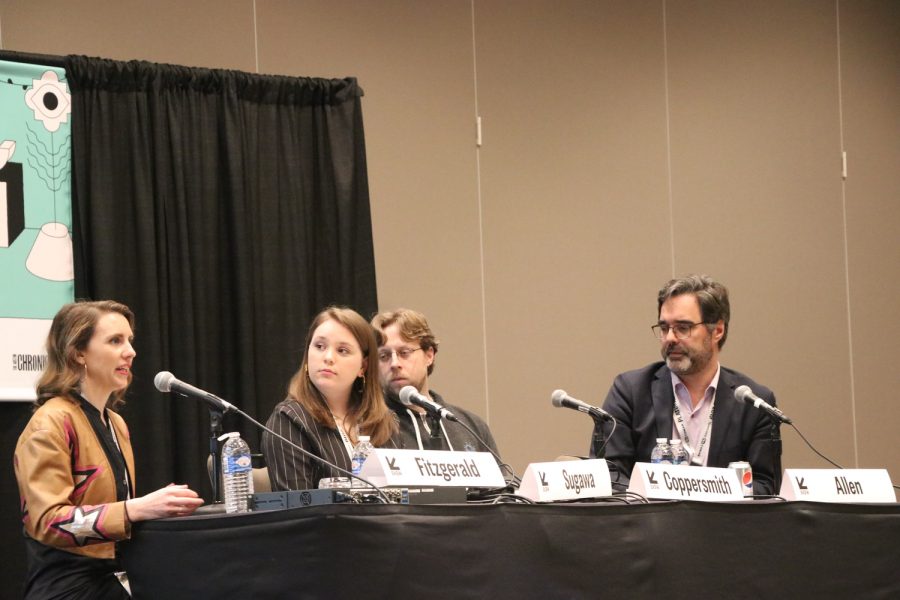WTF is up with my teen
Review
LASA freshman Lucy Sugawa moderates the “What the F- is Wrong With My Teenager?” panel at SXSW. Sugawas role is to be the teen advocate at the panel full of other adults. photo by Sarah Mines
April 9, 2019
Parents for generations have been baffled by the teenage years. As their children transform from kids to teenagers, parents find it difficult to communicate with their child and understand why they do the things they do.
Dr. Nick Allen, a professor of Clinical Psychology at the University of Oregon; Caroline Fitzgerald, a project lead at HopeLab and former occupational therapist; and Dr. Glen Coppersmith, CEO at Qntify, sat together on the “What the F- is Wrong With my Teenager?” during SXSW. The panel covered adolescence, technology and mental health during teenage years. Additionally, freshman Lucy Sugawa moderated the panel and provided a teenage voice in the discussion. The panel was part of the convergence track of SXSW and had a genuine feel that seemed to embrace the awkwardness of being a teen. On the screen next to the speakers, each of the panelists had a photo of themselves as a teenager and they frequently referenced personal stories of mistakes that they had made and how they learned from those experiences.
Often times, conversations about teens lack an essential component to understanding this transitional and transformative period. Without a teen voice, Fitzgerald said that it can be easy to resort to oversimplifying teenage behavior such as a disinterest in spending time with family as a “teenage problem” instead of realizing that it is a period in someone’s life when they become more independent and develop stronger connections outside of their immediate family. Additionally, Fitzgerald believes that technology and social media shouldn’t be written off as something harmful because many teens use it to communicate with friends and find communities that share their interests.
Allen, when asked about the best ways to parent a teenager, said that having an open and honest dialogue with a teenager is the best way to build trust and a respectful relationship. Allen said that psychologically, teenagers are highly susceptible to recognizing when they are being treated with respect, so treating them as an equal is important to avoiding tension during difficult conversations. He recommends that when parents have a difficult time understanding why their teens react in the way they do, especially concerning social media and technology, they should reflect on their own teenage years and how their parents treated the things that they might not have understood.
Sugawa didn’t hesitate from offering her perspective on issues such as the transition from middle school to high school and dealing with the frustration of communicating with parents. She said that she felt as if it was important to be a voice for teens on the panel as they know what it’s like to be a teen better than anybody else.
“They, however, can’t change things by themselves,” Sugawa said. “Making the world an easier place for teens to ask for help can only be achieved through teamwork, with adults and teens working together for a better understanding of the way teens work and how best to help them navigate this part of life.”


